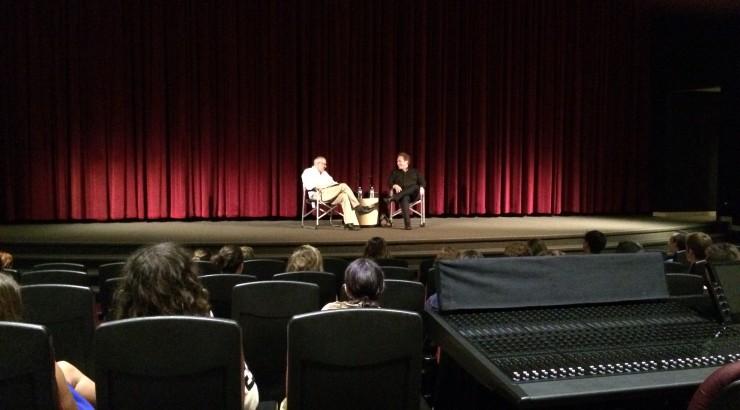David Fury Speaks To New Era Of Television
September 17, 2015
I love LOST. It’s seriously my favorite TV show of all time. Hands down. So, of course, when I heard that David Fury, writer/producer extraordinaire, would be a guest for Ross Brown’s New Era of Television (TWP-510-01), I absolutely made myself available to hear him chat with the class. And the fact that he was going to screen one of my favorite LOST episodes also? Well, that was just an added bonus.
I was surprised to learn that Fury actually started his career as an actor, but kept himself busy doing standup comedy between gigs.
“It was the easiest way to perform, without actually have a job,” he joked to the class.
The standup lead to him creating a sketch comedy group, which became such a hit that they moved out to LA to pursue it further. He was surprised that, after each show, people weren’t asking about individual actors or performances, but rather about who wrote what sketches. He didn’t consider himself much of a writer, but since he had written the majority of sketches, he became to realize that perhaps there was more to writing than he originally thought.
Shortly after, he wrote a Seinfield spec script that got him an agent, and his next spec script actually got him his first job in comedy. It wasn’t long after that that Joss Whedon was looking for comedy writers to writer on this new show he was working on: Buffy the Vampire Slayer.
“Joss was getting sent a lot of drama writers, who were all great, but he wanted people to help infuse comedy into the show, which is how I wound up there. My wife and I, who were a writing team up until that point, for the first time ever, went to work on different projects. She went to Mad About You, and I went to Buffy. It was a new experience for both of us,” Fury said.
As time went on, his writing for Buffy got more and more serious. By the end of the run, it was the most dramatic writing he had ever done, but it was very rewarding.
“And then, right after Buffy, I went to work for the funniest show on television: 24!” Fury joked.
“I remember I kept trying to work jokes into the scripts for 24, and the producers came to me and said ‘This is very funny. We laughed. But we don’t do this.’ So, it was very serious from then on,” Fury said.
His writing work on 24 eventually lead him to work on LOST, and now, Homeland.
Having grown up listening to comedy records, especially Bob Newhart, it had a real influence on his writing. In fact, it was these records that he credits with helping him write natural dialogue, because the flow of their comedy was very much its own conversation.
When asked about “Walkabout,” the episode of LOST that was screened for the students, Fury spoke of how great it was to shape the character of John Locke, to set up his tone for the rest of the show.
“They didn’t know who Locke really was in the pilot, so to be able to create this amazing, complex backstory so early on in the process was a real gift.”
He was also asked about what it was like to work with these big names, like Whedon and Abrams, before they became the household names they are today.
“Whedon is finest storyteller I’ve ever met. Amazingly talented, too. I mean, he wrote an amazing musical episode, complete with score, even though he just learned to play piano the year before. That’s crazy!”
He also spoke of how working on Buffy was the best time of his career. It was the first time he ever felt that writers were really getting a spotlight.
“We, the writers, were mobbed at Comic Con one year. It was all new. There were fan clubs dedicated to us. People knew our names and responded to our work.”
His writing style has changed nowadays, though, because of how shows are shown on television and new media.
“On networks, you wrote toward act break, you end on cool moments. You needed to give the audience a reason to come back. Now, you don’t need to do that, with binge watching. You don’t need a sense of acts, per se, just the beginning, middle, and end.”
When asked about his research for counter terrorism efforts, on shows such as 24 and Homeland, his answer was very surprising.
“Not a lot, honestly, but we keep up with current events,” Fury said. “We know what is going on with the world. But honestly, we’ve absorbed enough through media and entertainment to fake our way through. People from State Department visit us and go ‘How did you know that?!’ But we’re are making it up, honestly, and just writing what seems logical!”
On the subject of the new era of television, Fury explained a bit what he thought that meant.
“The new era is much more grounded, I think. The older series were more about plot. These days, it’s more about character based shows.”
Despite his massively successful career, he still misses doing comedy.
“I enjoyed it a lot. It’s how I started career. It was my greatest asset but now I don’t get to flex that muscle as much as I’d like. I rely on clever banter to get me through the day! I would love to get back into it in some way in near future.”
But that doesn’t stop him from having a fun career writing, and creating entertainment. He thoroughly appreciates each and every person who takes the time to watch his work.
“But, man, I can’t wait to make people laugh again!”


